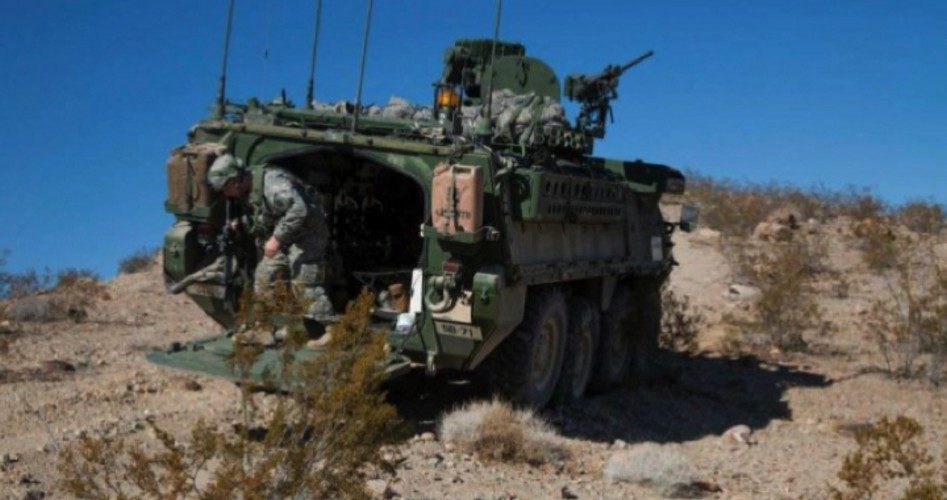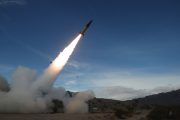
President Obama will be asking Congress to authorize military action against the Islamic State in Iraq and Syria, probably by the end of the week, the Washington newspaper The Hill reported Wednesday night. The request is expected to come just days after the latest ISIS outrage, the release of a video showing a Jordanian pilot being burned alive. Over the past several months the Islamic militants have released videos showing their beheadings of three Americans, two British citizens, and two Japanese.
“I do think it’s forthcoming,” Senator Bob Corker (R-Tenn.), chairman of the Foreign Relations Committee, told The Hill. Corker said he would be surprised and “disappointed actually” if a war authorization request from the White House is “not here by the end of next week. And maybe sooner.” White House press secretary Josh Earnest said Wednesday that work was proceeding on developing a request for Authorization of the Use of Military Force “that could earn bipartisan support.”
“I would anticipate we would have more news on an AUMF relatively soon,” he said.
The United States has been employing airpower against the Islamic State since last August. A U.S.-led coalition has conducted 2,264 strikes in Iraq and Syria, killing more than 6,000 ISIS fighters, The Hill reported. Obama did not ask for congressional authorization when he began that campaign, nor did he express a need for it when he discussed the conflict in an address to the nation on September 10. In a background briefing before that speech, White House officials told reporters that the president had authority under the 2001 AUMF, passed by Congress after the terrorist attacks of September 11. That joint resolution authorized the president (then George W. Bush) to
use all necessary and appropriate force against those nations, organizations, or persons he determines planned, authorized, committed, or aided the terrorist attacks that occurred on September 11,2001, or harbored such organizations or persons, in order to prevent any future acts of international terrorism against the United States by such nations, organizations or persons.
The Islamic State did not yet exist on September 11, 2001 and al-Qaeda, the organization said to have organized and carried out the 9/11 attacks, is now among the Islamic State’s enemies in Syria. In his address to the National Defense University in May 2013, Obama declared the 2001 AUMF outdated and said he would “look forward to engaging Congress and the American people in efforts to refine, and ultimately repeal, the AUMF’s mandate.”
Why he would seek to refine that which he wishes to repeal is unclear. But in seeking a new AUMF at this point in the fight with ISIS, the president apparently wants to go beyond the airstrikes that the United States and its allies have been carrying out for the past six months. Despite his oft-repeated pledge that “we will not get dragged into another ground war in Iraq,” the authorization the president seeks will likely leave open the possibility of sending in combat units against ISIS, something both Chairman of the Joint Chiefs of Staff Martin Dempsey and outgoing Defense Secretary Chuck Hagel have said may be necessary. If Congress approves the type of language used in previous authorizations, giving the president leave to use “all necessary and appropriate force,” it will have signed another blank check, leaving it solely to the president’s discretion whether sending American combat units into another ground war in the Middle East is “necessary and appropriate.”
Some members of Congress, on both sides of the aisle, sound ready for an all-out war. “Not the degrading of ISIS, not the containing of ISIS, but the destroying and crushing of ISIS has got to be the first and foremost goal,” Representative Adam Kinzinger (R-Ill.) told Fox News. “It clarifies what was clear before, which is there’s going to be overwhelming congressional support for this,” said Seator. Tim Kaine (D-Va.), predicting “a strong, strong supermajority of members of both houses in both parties” to grant the president the warmaking authority. Rep. Steve Cohen (D-Tenn.) told The Hill he is “open to” the option of committing U.S. ground troops to the battle. The recent beheading of the Japanese hostages and the immolation of the Jordanian pilot shows “we’re dealing with one of the most heinous groups that we’ve seen, and we need to take action for the protection of humanity,” Cohen said.
Protecting all of humanity is a rather broad mission, far exceeding the responsibility to “provide for the common defense” of the United States, as called for in our Constitution. If the barbaric execution of the Jordanian pilot further clarifies for Congress the nature of ISIS, it has clarified it even more for Jordan. King Abdullah II was given a hero’s welcome when he returned from Washington after ordering the hanging of two convicted terrorists with ties to the Islamic State. Before leaving the United States, the king reportedly vowed “retaliation” and a “getting after the bad guys,” saying the only problem in fighting ISIS would be “running out of fuel and bullets.”
To assure that doesn’t happen, the State Department announced the United States would be sending $1 billion in aid to Amman, in addition to the $660 million a year Washington already sends the Jordanian government. The “unprecedented strains” caused by the war with ISIS were cited as the reason for the increase.
In Cairo, Grand Imam Ahmed al-Tayeb called for the Islamic State extremists to be “killed, or crucified, or their hands and legs cut off.” In Syria, both the government and the al-Qaeda forces opposing it condemned ISIS. “There was one sentiment that many of the Middle East’s competing clerics, fractious ethnic groups and warring sects could agree on Wednesday: a shared sense of revulsion at the Islamic State’s latest atrocity,” the New York Times reported.
That being the case, why should the United States be responsible for, in Representative Kinzinger’s words, “the destroying and crushing of ISIS”? Surely the nations in the region, united by their “revulsion” of the Islamic State, can muster enough forces to massively outgun and outnumber the estimated 20,000 to 30,000 fanatics in ISIS. Turkey, a nation of 76 million, has the second-largest army in NATO, armed with U.S. weapons, and an air force. Yet the Turkish government is more interested in supporting “Syrian moderates” fighting the Bashar al-Assad regime than in engaging ISIS forces.
Iran, eager to extend its military and political influence in neighboring Iraq, has sent ground forces there and joined the air war against ISIS. Yet some of the hardliners in Congress, while demanding action to crush the Islamic State, have also been calling for more and tougher sanctions against Iran over its nuclear program — despite the fact that U.S. intelligence agencies have twice reported they could find no evidence of an Iranian effort to build a nuclear bomb. And a year ago, John McCain, Lindsey Graham, and others were calling for an air war to topple the Assad regime now fighting ISIS in Syria.
Syrians, Iranians, Saudis, Egyptians, Jordanians, and others in the region have more at stake in the fight against ISIS than the United States does. The battle is in their yard. The power vacuum created by the predicted “cake walk” in Iraq in 2003 opened the door to the Islamic State that is now spreading terror in Iraq and Syria.
Before Washington’s White House warriors and Capitol Hill crusaders take the nation into another years-long War of the Month against another enemy de jour, they might recall what former Secretary of Defense Robert Gates said after eight years of U.S. fighting in Iraq. “In my opinion, any future defense secretary who advises the president to again send a big American land army into Asia or into the Middle East or Africa should ‘have his head examined,’ as General MacArthur so delicately put it,” Gates told an assembly of Army cadets at West Point in February 2011. The same could, and should, be said of members of Congress.
There may be some heads on Capitol Hill in need of examination.



